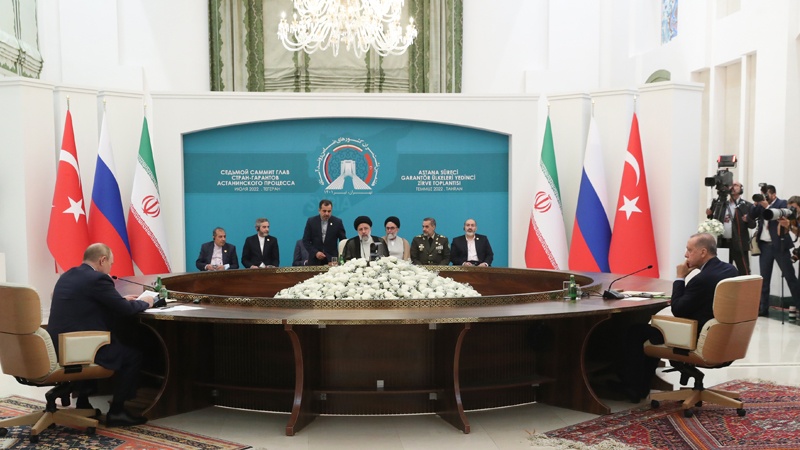On 19 July, the Presidents of Russia, Iran, and Turkey met in Tehran as part of the so-called Astana process – a trilateral dialogue organized by the three countries and set up in 2017 as a complement to the UN-led peace process for the conflict in Syria. While the Astana talks are held on a regular basis, the meeting on 19 July was the first attended by the presidents of the three countries since 2019, when former Iranian President Hassan Rouhani also invited his counterparts to Iran.
A joint, 16-point statement was issued following the meeting and signed by the three countries that briefly reviewed the topics discussed during the meeting and emphasized the importance of continuing the dialogue within the Astana framework. Like previous statements, the communique affirmed several long-term goals – like the need for a political solution and intent to strengthen the dialogue – but lacked specific detail on how to achieve said aims.
The lack of substance reflects the very significant disagreements that continue to undermine prospects for constructive dialogue between the three sides, mainly when it comes to Turkey’s relationship with the Syrian government and Iranian-Russian opposition to Turkey’s military activities in northern Syria. For example, the document paradoxically affirmed each side’s “unbreakable commitment to the sovereignty” and “territorial integrity” of Syria yet – in a clause likely inserted by Turkey referencing the PKK – simultaneously determined to fight terrorist groups that operate “under various labels”. The langue is sufficiently vague to be seen as providing justification for both continued cross-border “counter-terrorism” activities and efforts to protect Syrian sovereignty.
One notable point of convergence however, involved opposition to Israeli military activities, with one point in the statement condemning Israeli military activity in Syria. This is noteworthy given Russia’s previous reluctance to openly criticize Israeli activities and Turkey’s recent overtures towards Tel Aviv that aim to normalize relations.
In a subsequent press conference attended by all three, each leader addressed various issues that, while attempting to convey an atmosphere of cooperation, again illustrate the divergent and sometimes conflicting interests of each side. President Erdogan stressed the need to end terrorism and attempted to portray a unified front against the PKK while providing a justification for continued Turkish military operations in northern Syria. In an implicit contradiction, President Raisi said the three countries emphasized the importance of maintaining Syria’s territorial integrity, and that all three agreed that the Syrian government should have sovereignty over all parts of the country. A somewhat paradoxical and questionable statement given Turkey’s support for oppositional Free Syrian Army factions and the presence of regular Turkish forces in northern Syria.
Putin’s remarks more vaguely said the three sides will continue to work towards a political solution and stressed the importance of the Astana format to continue this dialogue. Like his Iranian counterpart, Putin also called to end foreign presence that violates the sovereignty of the Syrian government and, without mentioning the US, emphasized the need to restore government control east of the Euphrates River.
Overall, the meeting on 19 July unfolded as expected and without any significant breakthrough in the Syrian peace process. Instead, all three sides will likely continue to view the Astana format as a platform to address disagreements, pursue and emphasize specific interests and, to a more limited extent, coordinate areas of cooperation. This includes mainly Turkish-Russian cooperation in maintaining de-escalation zones and conducting joint patrols around Idlib which is assessed to have played a role in preventing a wider escalation as feared at the beginning of the previous year. Like the stalled UN-led peace process, however, any expectations that the Astana track will produce more permanent settlements and agreements remain low.


